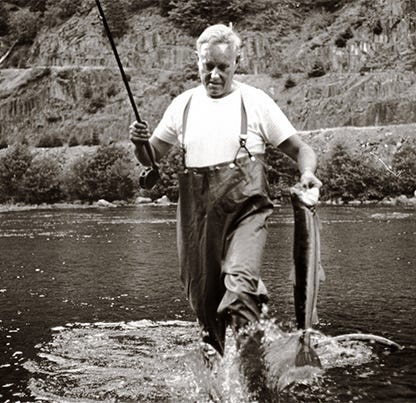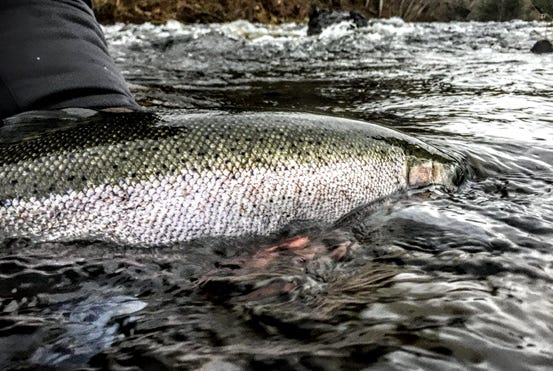This Earth Day Be a Steward of Oregon
We all should embrace the challenge of preserving our wildlife heritage, we owe it to future Oregonians and the animals themselves.
Editor’s Note: Do your part to Sustain the Way!
27 Oregonians have gotten us to $1,210 - keep the momentum going so we can hire a part time editor.
Will you send $20?
Donate here or subscribe below to create a part-time editor position.
Elden Rosenthal worked as an Oregon trial lawyer from 1972 to 2017. He’s a member of the Board of Directors of the Southern Poverty Law Center.
A few years ago I had dinner with an Idaho rancher whose property encompasses a stretch of Silver Creek, a blue ribbon spring creek world famous for its healthy population of wild trout. The rancher had, at considerable expense, taken steps to enhance the trout habitat on the creek, through a combination of dredging to rejuvenate gravel beds and riparian repairs. I pointedly asked him why he had taken those steps, why he had spent the money. In a halting and somewhat self-conscious manner he told me that his motivation was the biblical admonishment to be a good steward of the land.
We are all familiar with the sentiment that our children are really not “ours,” but are simply loaned to us. The Idaho rancher felt the same way about his family’s land and the stream that runs through it. The steelhead and salmon that grace our land and our imaginations, that have nurtured Oregon’s land and the humans who live here, are not ours to despoil. We are the stewards of these magnificent animals, they are merely on loan to us.
If the fish were looking for trustworthy borrowers, they’d likely have picked a different group to protect their ways and livelihoods. We all know the general outline of the anadromous fish story. Our rivers were once filled with steelhead and salmon, nourishing the deserts and forests of Oregon, inspiring Oregonians with their heroic journeys from the far reaches of the ocean to their spawning gravel. Overfishing, poor agricultural practices, dams, and mining have decimated their population. Their watersheds are compromised, yet still they return; their numbers are a fraction of historic levels, yet they have survived. They run the gauntlet of commercial and sports fishers; they navigate dams; they find the spawning gravel that is still available. Their resilience and toughness is both humbling and ennobling. Their biggest challenge, however, looms ominously. Climate change may be the obstacle they cannot overcome.
Entrusted to steward the environment, for too many decades we’ve shut our eyes and turned away from the havoc we have wreaked despite knowing what ought to be done to care for the land, water and, animals under our watch. Steelhead and salmon not only need clean water and gravel beds to survive. They need cold oxygenated water. Exposure to water temperature above 21° Celsius (69° Fahrenheit) for extended periods of time are lethal to adult, migrating fish. Chinook salmon need temperatures below 15° C (59° F) to spawn; for eggs to survive the optimal temperature is between 8° and 12° C (46° to 54° F). Steelhead need similar temperatures. These water temperatures were historically available throughout Oregon, but climate change and declining winter snow packs, along with dams, and certain forest and agricultural practices threaten to raise water temperatures to dangerous levels. These facts are not in dispute. The EPA has forecast temperature increases of 0.3° C (0.54° F) per decade in the Columbia River. By 2040 the Columbia will become a lethal trap for migratory fish.
To restore our creditworthiness, we need to take drastic action. That’s why it’s important that last summer the Oregon Fish and Wildlife Commission unanimously adopted a Climate and Ocean Change Policy. The Policy statement (you can read it here) begins by acknowledging climate change caused by greenhouse gases and that the changing climate is “undermining the ability of lands and waters to support Oregon’s native fish and wildlife, and the cultural and economic benefits they provide.” Assuming our continued poor management, the Commission specifically predicted changing precipitation patterns, decreased snowpack, increased marine and fresh water temperatures, and increased numbers and intensity of wildfires.
Based on this understanding of the reality of climate change, the Commission set forth several overarching policy principles as guidelines for future actions—essentially aspirational rules for us as tenants of Oregon. These principles include conserving native species where and when possible, and—when irreversible changes in Oregon’s climate and habitat render conservation unlikely to succeed—changing conservation policies to preserve species in more hospitable habitats.
Whew, that was a mouthful. And sobering. The Commission is telling Oregonians that some species in some areas may not be able to survive. Focusing on steelhead and salmon, when the river water is no longer cold enough for these Northwest icons, we may have to say goodbye to them in some of their historical drainages.
All Oregonians ought to heed the warnings and become better stewards. Unless we act cooperatively, the experts are telling us that these wonderful animals may disappear, drainage by drainage. The Commission has promised to “work with the public and landowners to encourage or incentivize habitat management that protects and enhances priority areas for fish and wildlife as well as increasing carbon sequestration.” The Oregon Fish and Wildlife Commission is seeking funding for a Habitat Management Division, certainly a necessity in these times. But it will take more than a state agency making recommendations and policy proposals. We all should embrace the challenge of preserving our wildlife heritage, we owe it to future Oregonians and the animals themselves.
We ask ranchers and loggers, manufacturers and miners to change their methods of operation to preserve the environment. As we ask our fellow Oregonians to consider changing operations in the service of conservation, we should also ask urban dwellers to change their habits of home energy usage and gasoline consumption. We are all in this together.
This publication, The Oregon Way, was inspired by the politics of Governor Tom McCall. The iconic photo below of Tom McCall shows him striding out of the North Umpqua River, fly rod in his right hand and a steelhead in his left. Yet the precious steelhead that—along with Pacific salmon—are emblematic of Oregon are in ever increasing danger.
We should heed the Idaho rancher whose stewardship of his land included providing safety for wild fish. It will cost us some money and some inconvenience. But it is the moral choice and our obligation as stewards of this incredible state and its bounty.

***************************
Keep the conversation going:
Facebook (facebook.com/oregonway)
Twitter (@the_oregon_way)



